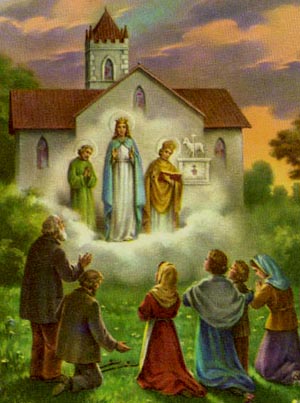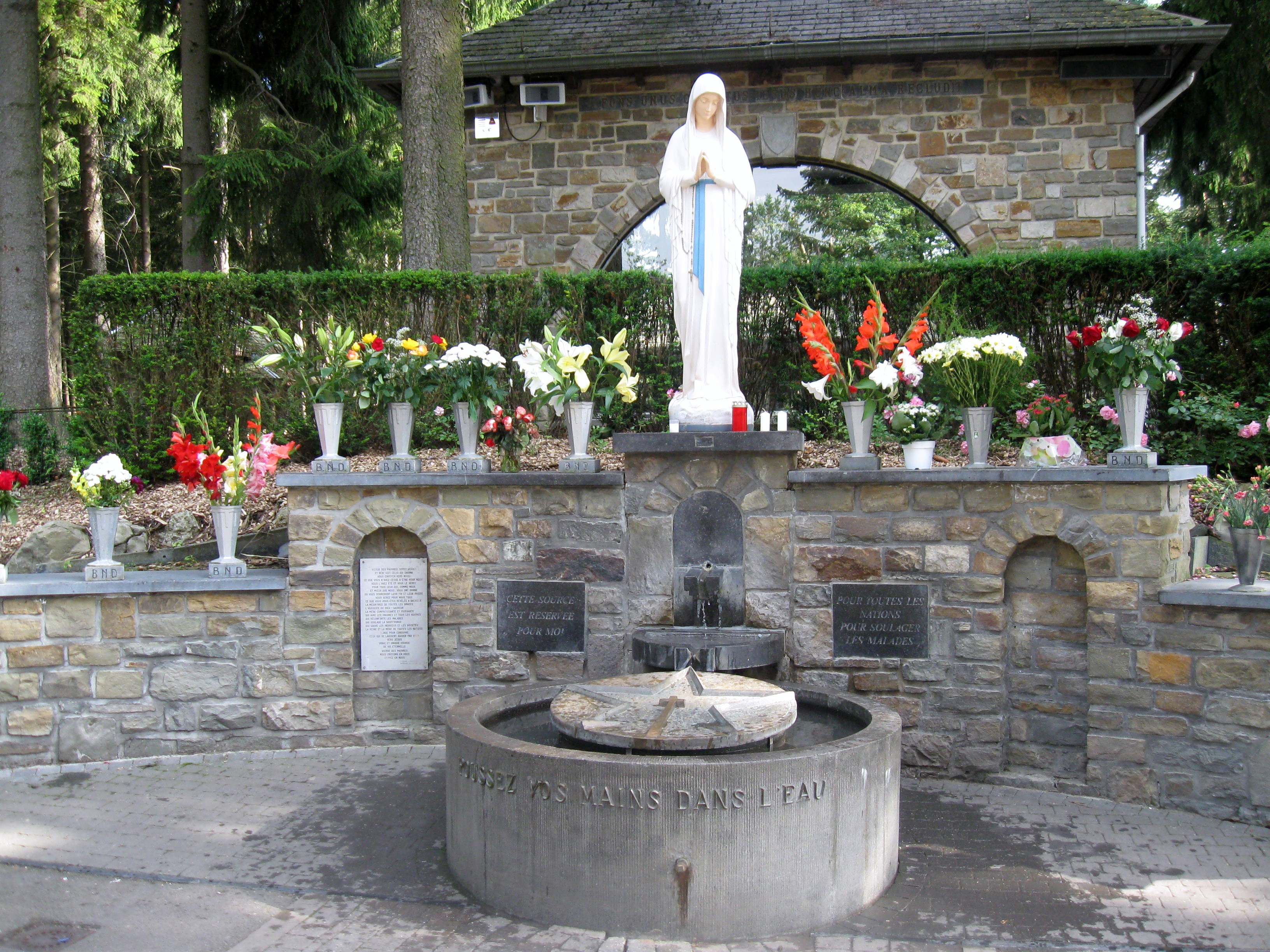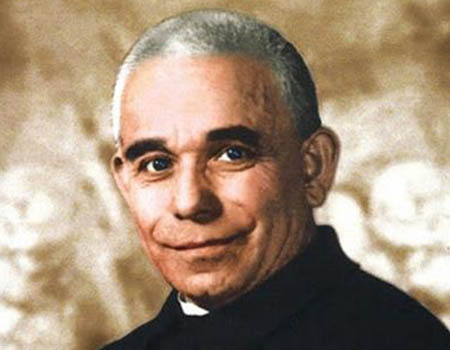Madonna Addolorata di El Escorial
26/06/2014
Catechesi N. 34
A - La presenza dello Spirito Santo plasma l'anima fino a renderla buona, mite, forte nel dominarsi.
B - Oggi dobbiamo chiederci cosa abbiamo fatto noi per Gesù in questi anni.
C - Un piccolissimo sacrifico con una intenzione retta vale più delle penitenze di un anno con una intenzione piena di amor proprio.
Filmato delle apparizioni straordinarie di El Escorial in Spagna. Cliccare sotto per vedere il video.
http://www.youtube.com/watch?v=GCQSs11tBZE
http://www.youtube.com/watch?v=qcVd8yfPwJg
Fermiamoli chi ha il potere cerchi di fare qualcosa per fermarli.
08/06/2014
A - Si parla spesso dello Spirito Santo e si magnifica la sua azione. Si crede nella sua opera santificatrice e fioriscono incontri di preghiera. Invocare lo Spirito Santo è una importante pratica del cristiano. Adorarlo è il modo per ricevere la sua visita. Non si spiegano però i comportamenti poco spirituali di molti cristiani che recitano preghiere allo Spirito Santo e ne sono devoti.
L'assenza dei frutti dello Spirito Santo indicano che non c'è una vera comunione e la preghiera non è efficace. Come si spiega?
La devozione allo Spirito Santo è autentica solamente quando si manifestano alcuni comportamenti inequivocabili, in mancanza dei quali non si può parlare di azione di Dio in quell'anima. Semplice ma sicura questa ricostruzione. E’stato lo stesso Gesù a parlare di frutti: "Dai loro frutti li riconoscerete" (Mt 7,16).
Egli aggiunge inoltre un'avvertenza che dobbiamo ricordare ogni giorno. E’ davvero molto importante, soprattutto in questi tempi di sbandamento organizzato della Chiesa: "Guardatevi dai falsi profeti che vengono a voi in veste di pecore, ma dentro son lupi rapaci" (Mt 7,15).
I frutti spirituali svelano la vera identità di una persona, e non sono le sue parole a scoprire quale spirito è alla guida della sua vita. È vero che anche le parole ipocrite spesso svelano il marcio di chi è contro Gesù. Solitamente con le parole si inventa e si costruisce il contrario di tutto. Le opere invece non possono ingannare. Non alcune opere ma tutte le opere della persona.
Leggiamo questo insegnamento che abbiamo ascoltato molte volte. Adesso lo dobbiamo meditare lentamente e per una decina di minuti: "Dai loro frutti li riconoscerete. Si raccoglie forse uva dalle spine, o fichi dai rovi? Così ogni albero buono produce frutti buoni e ogni albero cattivo produce frutti cattivi; un albero buono non può produrre frutti cattivi, né un albero cattivo produrre frutti buoni" (Mt 7,16-18).
Qui, per albero cattivo non si intende la persona che pecca, o chi pecca per debolezza. Albero cattivo indica invece la persona corrotta nel cuore, che vive per il male e gioisce quando vede la sofferenza altrui. C'è una scala di cattiveria che noi non riusciamo a considerare talmente è misteriosa, ma le persone che hanno commesso cattiverie volontarie anche se minime, hanno sempre la possibilità di riparare e ricominciare una vita santa.
L'analisi di San Paolo ai Romani mostra gli effetti dei comportamenti dell'uomo: "Fratelli, quelli che vivono secondo la carne, pensano alle cose della carne; quelli invece che vivono secondo lo Spirito, pensano alle cose dello Spirito. Ma i desideri della carne portano alla morte, mentre i desideri dello Spirito portano alla vita e alla pace.
Infatti i desideri della carne sono in rivolta contro Dio, perché non si sottomettono alla sua legge e neanche lo potrebbero. Quelli che vivono secondo la carne non possono piacere a Dio.
Voi però non siete sotto il dominio della carne, ma dello Spirito, dal momento che lo Spirito di Dio abita in voi. Se qualcuno non ha lo Spirito di Cristo, non gli appartiene. E se Cristo è in voi, il vostro corpo è morto a causa del peccato, ma lo spirito è vita a causa della giustificazione.
E se lo Spirito di colui che ha risuscitato Gesù dai morti abita in voi, colui che ha risuscitato Cristo dai morti darà la vita anche ai vostri corpi mortali per mezzo del suo Spirito che abita in voi".
Abbiamo meditato nei giorni scorsi i doni dello Spirito Santo. Abbiamo compreso che la loro presenza deve necessariamente manifestare all'esterno buoni effetti. Inoltre ci sono i frutti dello Spirito di Dio che sono più direttamente in relazione con il bene del prossimo. I frutti che mettono in evidenza l'azione dello Spirito Santo in un'anima li sintetizzo qui:
La bontà - è la disposizione del cuore buono, di coloro che non pensano mai a far del male e desiderano il bene di tutti.
La benevolenza - richiede uno sforzo per fare sempre del bene a tutti, senza pensare a propri interessi.
L'amore - è il contrario di egoismo. Chi ama è sempre pronto a donare il perdono a chi ha sbagliato.
La gioia - allontana ogni forma di chiusura, espande buonumore, e trasmette felicità.
La pace - è l'atteggiamento di chi non porta alcun risentimento e non ricorda più fatti passati.
La pazienza - porta consiglio, favorisce una maggiore maturità spirituale.
La fedeltà - è inevitabile. Fedeltà a Dio e alla famiglia, all'amicizia. Gesù richiede a tutti una fedeltà convinta e piena, non c'è vera comunione con Lui se non mostriamo nei fatti una sincera fedeltà alla sua Parola.
La mitezza - è docilità intelligente, non è passività causata dalla paura. La mitezza infonde determinazione.
Il dominio di sé - è la padronanza degli istinti, l'abilità del proprio controllo, il dominio delle parole, dei pensieri, delle opere.
La presenza dello Spirito Santo plasma l'anima fino a renderla buona, mite, forte nel dominarsi. Senza la sua azione ineffabile in noi, nessuno è in grado di elevarsi verso l'alto. Nessuno riesce a vivere il Vangelo come ci chiede Gesù.
Buona preghiera a tutti.
11/06/2014
B - La gratuità nella donazione del proprio tempo per dedicarsi al bene delle anime è una imprescindibile caratteristica del Sacerdote. Egli ha deposto nell'Ordinazione la sua volontà a Dio e dovrebbe ripetere con San Paolo: "Non sono più io che vivo ma Cristo vive in me" (Gal 2,20).
Rileggiamo il versetto completo per comprendere quale disposizione interiore muoveva l'Apostolo: "Sono stato crocifisso con Cristo e non sono più io che vivo, ma Cristo vive in me. Questa vita nella carne, io la vivo nella Fede del Figlio di Dio, che mi ha amato e ha dato se stesso per me".
Ogni cristiano è stato redento gratuitamente. Un infinito atto di Amore ha spinto Gesù a donare se stesso per redimerci tutti.
La gratitudine è la risposta delle anime sensibili, è il riconoscimento sincero che si prova riflettendo sulla Passione di Gesù. Non è naturale ringraziare Gesù per quello che ha fatto per ciascuno di noi. Si arriva a questa forma di ringraziamento solo attraverso la considerazione dei suoi patimenti.
Davanti al Crocifisso si sono formati i Santi. Con la meditazione delle piaghe e della morte del Signore si capisce quanto ci ama Dio.
Solo meditando la sua Passione si arriva a comprendere la premura che infonde ai suoi discepoli, nel portare la Parola in ogni angolo della terra. "Predicate", ripete Gesù ai cristiani, e tutti i cristiani possono annunciare che il Signore è vivo con la testimonianza di una vita integra. Consacrati e laici possono illuminare molti con l'esempio della loro vita onesta.
Nel Vangelo di oggi colgo un'ansia intrattenibile in Gesù di salvare l'umanità. Ma come potrà avvenire questo se gli apostoli che Lo seguono con coerenza sono pochi? Alcune ore fa riflettevo sulla ricerca di Gesù di trovare tanti apostoli per la diffusione del Vangelo. Gesù ha bisogno di uomini e donne coerenti per far conoscere ai peccatori la sua misericordia.
Oggi dobbiamo chiederci cosa abbiamo fatto noi per Gesù in questi anni. Se abbiamo vinto l'egoismo e abbiamo dedicato del tempo alla diffusione della Parola oppure ci siamo accontentati di rimanere spettatori. Infatti, rimane spettatore chi ritiene sufficiente la Messa festiva e la preghiera giornaliera. E per il resto? Non è un dovere ringraziare Gesù aiutandolo nella nuova evangelizzazione?
In molti casi, non si fa nulla nell'apostolato e non si compie alcuno sforzo per vincere le proprie debolezze e praticare le virtù. Non è assolutamente sufficiente accontentarsi della Messa e di alcune preghiere. Il vero cammino spirituale richiede ogni giorno degli sforzi per vincere le passioni disordinate, controllare gli impulsi, abbattere i vizi e reagire alle debolezze.
Gli apostoli che si impegnano e mettono Gesù al centro della loro vita, vengono ricolmati di Grazie, diventano anime predilette.
Agli apostoli di tutti i tempi Gesù dà il mandato di operare nel suo Nome con una potenza infinita perché è quella di Dio: "Guarite gli infermi, risuscitate i morti, purificate i lebbrosi, scacciate i demoni".
Anche i laici possono avere un potere fortissimo sui diavoli. Luisa Picarreta è stato un grande esempio. I laici che si purificano conducendo una intensa vita spirituale, si elevano sempre più in alto e Gesù ha molta fiducia di loro. La loro preghiera diventa potente e i diavoli hanno paura.
Però i laici non devono mai fare preghiere di esorcismo sugli altri. E’ la Fede che compie meraviglie di Grazia. Buona preghiera a tutti.
18/06/2014
C - Il Vangelo oggi tocca un aspetto molto delicato e sottile della vita spirituale: la retta intenzione. Mette una sostanziale distinzione tra l'atto esterno e l'intenzione, quando questa , appunto, non è retta. È la condizione di chi pensa qualcosa e ne dice o compie un'altra.
Un'azione priva di genuinità, quindi di sincerità e di semplicità, non è pura. Si trasforma in ipocrisia, in inganno, in ostentazione.
È sottile la separazione tra la retta intenzione e l'amor proprio. Non è sempre facile accertare questa distinzione. Anche perché la poca spiritualità di un credente esprime una scarsa capacità di conoscenza personale, di amore verso Gesù, di purificazione interiore.
La retta intenzione diventa sempre più pura e gradita a Gesù nella misura della purificazione e di una conversione sincera.
Dovete chiedervi senza allarmarvi e senza abbattervi, quale pensiero vi spinge nel compiere un'azione e altre opere che esteriormente danno l'impressione di gesti caritatevoli. Quale pensiero arriva alla mente e si esegue quando si compiono determinati gesti buoni?
Spesso arriva la tentazione di satana per farvi perdere meriti davanti a Dio. Ma il più delle volte è lo spirito umano a far scaturire un doppio pensiero, un altro che si sovrappone al primo e magari questo era già buono di suo. Ma ne arriva un secondo e lo si accoglie e lo si applica a quell'azione. Essa così in un istante perde la grande validità davanti a Dio e si svuota della santa intenzione.
È questo un discorso delicato e inesplorato. Forse troverete qualche spiegazione sulla retta intenzione ma non sul secondo pensiero che si conosce solo per Grazia di Dio. I diavoli cercano in continuazione di distogliere nei cristiani le buone intenzioni, quelle che rendono un'azione santa pur essendo piccola.
Un piccolissimo sacrifico con una intenzione retta vale più delle penitenze di un anno con una intenzione piena di amor proprio.
Sta qui la vera chiave per rendere le nostre opere, piccole e grandi, sante davanti a Dio. Opere compiute non per essere ammirati, non per vanagloria, non per superbia. Le anime spirituali vigilano attentamente per non lasciare stabilizzare un solo pensiero ingiusto o sleale e così invalidare, compromettere, un'azione che in realtà vogliono compiere per amore di Dio e del prossimo.
Nulla si deve compiere "davanti agli uomini per essere ammirati da loro, altrimenti non c’è ricompensa per voi presso il Padre vostro che è nei Cieli". Arriva una grande ricompensa ai buoni che con cuore puro agiscono con piena onestà. Dio è contento di loro ed elargisce ad essi abbondanti Grazie. Essi sono mediatori stimati dall'Altissimo, e sono le intenzioni rette in ogni loro opera a renderli attendibili.
La ricompensa di Dio non è qualcosa in più o è trascurabile. E’ l'espressione del suo Amore e il premio della nostra fedeltà.
Non tutti i credenti ricevono ricompense da Dio in questa vita e forse neanche nell'altra, e non fanno nulla per ricevere ricompense. Dio però è Padre misericordioso e concede gratuitamente doni e aiuti anche a quanti non li meritano. Ma non ne approfittano e sperperano ogni bene.
Cercare di ingannare Dio è un atteggiamento che si commenta da solo. Non è l'ostentazione ad ingannare Dio perché Lui vede dentro, conosce perfettamente tutto di noi. Quelli che fingono una falsa spiritualità "hanno già ricevuto la loro ricompensa".
Non sono inizialmente le opere a santificare il credente. Prima sono le sue rette intenzioni a renderlo gradito a Dio e degno di immensa fiducia. Solo così Dio si fa conoscere sempre più e inonda l'anima del credente del suo Spirito Divino.
Questo il motivo della grande spiritualità che posseggono le anime buone. Buona preghiera a tutti.
English Edition
Catechesis # 34
A - The presence of the Holy Spirit forms the soul to make it good, meek, strong to dominate itself.
B - Today, we must ask ourselves what we have done for Jesus in these years.
C - A small sacrifice with a right intention worth more penance than a year with a full intention of self-love.
06/08/2014
A - We often speak of the Holy Spirit magnifying his action. We believe in his sanctifying work and prayer meetings bloom. Invoking the Holy Spirit is an important practice of the Christian. Worship is the way to get his visit. However unspiritual behaviors of many Christians who recite prayers to the Holy Spirit and are devotees cannot be explained.
The absence of the fruits of the Holy Spirit indicates that there is no real communion and prayer is not effective. How do you explain that?
Devotion to the Holy Spirit is authentic only when certain behaviors occur unequivocal, without which one cannot speak of God's action in that soul. This reconstruction is simple but secure. Jesus himself spoke of fruit: "By their fruits ye shall know them" (Matthew 7:16).
He also adds a warning that we have to remember every day. It’s really important, especially in these times of organized confusion of the Church: "Beware of false prophets, which come to you in sheep's clothing, but inwardly are ravenous wolves" (Matthew 7:15).
The spiritual fruits reveal the true identity of a person, and his words are not to discover what spirit is at the helm of his life. It is true that even the hypocritical words often reveal the corruption of those who are against Jesus. With the words usually we invent and build the opposite of everything. The works on the other hand cannot deceive. Not some works , but all the works of the person.
Let us read this teaching that we have heard many times. Now we owe it slowly and meditate for ten minutes: "By their fruits ye shall know them. Perhaps are we gathering grapes from thorns, or figs from thistles? Thus, every good tree bears good fruit, but every rotten tree produces bad fruit; and a good tree does not can produce bad fruit, nor can a bad tree produce good fruit "(Mt 7.16 to 18).
Here, for bad tree we are not referring to the person who sins, or those who sin out of weakness. Bad tree indicates the corrupt person in the heart, who lives in evil and rejoices when he sees the suffering of others. There is a scale of nastiness that we fail to consider is so mysterious, but the people who have committed voluntary wickedness although minimal, they always have the ability to repair and start a holy life.
Analysis of St. Paul to the Romans shows the effects of human behavior: "Brethren, those who live according to the flesh set their minds on the things of the flesh, but those who live according to the Spirit set their minds on the things of the Spirit. But the desires on the flesh is death, while to be spiritually minded is life and peace.
In fact, the desires of the flesh is enmity against God because they are not subject to his law, nor can it be. Those who are in the flesh cannot please God.
Indeed you are not under the dominion of the flesh, but in the Spirit, since the Spirit of God dwells in you. If someone does not have the Spirit of Christ, does not belong to him. And if Christ is in you, your body is dead because of sin, but the Spirit is life because of righteousness.
And if the Spirit of him who raised Jesus from the dead dwells in you, He who raised Christ from the dead will also give life to your mortal bodies through His Spirit who dwells in you. "
We meditated in recent days the gifts of the Holy Spirit. We have understood that their presence must necessarily act out good effects. In addition there are the fruits of the Spirit of God that are more directly related to the good of others. The fruits that highlight the action of the Holy Spirit in the soul are summarized here:
The goodness - is the provision of good heart, for those who never think of hurting and desire the good of all.
Benevolence - requires an effort to always do good to all people, without thinking of their own interests.
Love - is the opposite of selfishness. Who loves is always ready to grant forgiveness to those who failed.
The joy – turns away any form of closure, expands in a good mood, and transmits happiness.
Peace - is the attitude of someone who does not carry any resentment and does not remember past events.
Patience - brings counsel, promotes a greater spiritual maturity.
The fidelity - is inevitable. Loyalty to God and family, friendship. Jesus requires all a convinced and full faithfulness, there is no real communion with Him if we do not show in facts a sincere faithfulness to his word.
Meekness - is intelligent docility, not passivity caused by fear. The mildness instills determination.
The domain itself - is the mastery of the instincts, the ability of its own control, the domain of words, thoughts, deeds.
The presence of the Holy Spirit forms the soul to make it good, meek, strong to dominate itself. Without his ineffable action within us, no one is able to rise to the top. No one can live the Gospel as Jesus asks us.
Good prayer at all.
06/11/2014
B - Gratuity in the giving of their time to devote to the good of souls is an essential feature of the Priest. He deposed in Ordination his will to God and should repeat with St. Paul: "It is no longer I who live, but Christ lives in me" (Gal 2:20).
Let us read the complete verse to understand what interior disposition moved the Apostle: "I have been crucified with Christ and I no longer live, but Christ lives in me. Was this life in the flesh, I live by faith in the Son of God, who loved me and gave himself for me. "
Every Christian has been redeemed for free. An act of infinite love impelled Jesus to give Himself to redeem us all.
Gratitude is the response of sensitive souls, it is the sincere recognition that evidence reflecting on the Passion of Jesus. It is not natural to thank Jesus for what He has done for each of us. You get to this form of thanksgiving only through the consideration of his sufferings.
Saints were formed before the Crucifix. With meditation on the wounds and death of the Lord you understand how God loves us
Only meditating his Passion you get to understand the concern that infuses his disciples, in bringing the Word in every corner of the earth. "Preach" , Jesus repeated to Christians, and all Christians can proclaim that the Lord is alive with the testimony of an upright life. Religious and lay people can illuminate many by the example of their lives honestly.
In today's Gospel, I take irrepressible anxiety in Jesus to save humanity. But how can this come about if the apostles who follow him with consistency are so few? A few hours ago I reflected on the research of Jesus to find many apostles to spread the Gospel. Jesus needs men and women in line to make his mercy known to sinners.
Today we must ask ourselves what we have done for Jesus in these years. If we won the selfishness and we spent time spreading the Word or we stuck to remain spectators. In fact, it remains a spectator who considers sufficient the Sunday Mass and daily prayer. And for the rest? It is not a duty to thank Jesus helping him in the new evangelization?
In many cases, nothing is done in the apostolate and no effort is made to overcome their weaknesses and to practice the virtues. It is absolutely not sufficient to settle the Mass and some prayers. The true spiritual path requires daily efforts to win the disordered passions, control impulses, break down in response to weaknesses and vices.
The apostles who are committed and put Jesus at the center of their lives, are filled up of Grace, become the favorite souls.
To the apostles of all times Jesus gives a mandate to act in his Name with an infinite power because it is the will of God: "Heal the sick, raise the dead, cleanse the lepers, cast out demons."
Even laymen can have a very strong power over devils. Luisa Picarreta was a great example. The laymen who purify themselves waging an intense spiritual life, rise higher and higher and Jesus has a lot of confidence in them. Their prayer became powerful and the devils are afraid.
But the laymen should never do prayers of exorcism over others. It is the Faith that accomplishes wonders of Grace.
Good prayer at all.
06/18/2014
C - The Gospel today is touching a very delicate and subtle aspect of spiritual life: the right intention. It makes a substantial distinction between the external act and the intention, when the latter , in fact, is not straight. It is the condition of those who think something and it says or makes another.
Action devoid of authenticity, and sincerity and simplicity, is not pure. It becomes hypocritical, deceptive, in ostentation.
It's subtle the separation between the right intention and self-love. It is not always easy to ascertain this distinction. Also because the lack of spirituality of a believer expresses a poor knowledge of staff, of love for Jesus, of inner purification.
Right intention becomes more and more pure and pleasing to Jesus and to the extent of purification and of a sincere conversion.
You have to ask without cautious and not cut you down, what thought motivates you in performing an action and other works that outwardly give the impression of charitable gestures. What thought comes to mind and you run when you perform certain good actions?
Often comes the temptation of Satan to make you lose merit before God. But most of the time is the human spirit to bring forth a double thought, another one that overlaps the first and maybe this was already good on its own. But it comes a second and you accepts it and apply it to that action. It thus loses in an instant the big validity before God and empties of the holy intention.
This is a delicate and unexplored speech. Maybe you will find some explanation on the right intention but not on second thought that is known only by the Grace of God. All the time Devils try to distract the good intentions among the Christians, those that make an action saint despite being small.
A very small sacrifice with a right intention worth more than penances of a year with an intention full of self-love.
Herein lies the real key to making our works, large and small, holy before God. Works carried out not to be admired, not for vainglory, not for pride. The spiritual souls supervise carefully so as not to leave a single thought to stabilize unjust or unfair and thus invalidate, impair, an action that actually they want to do for the love of God and of neighbor.
Nothing must be done "before men, to be admired by them, otherwise there is no reward for you from your Father who is in Heaven." There comes a great reward to the good that with a pure heart shall act with complete honesty. God is pleased with them and He gives them abundant Graces. They are estimated mediators by the Most High, and are righteous intentions in all their work to make them reliable.
The reward of God is not something extra or negligible. It is the expression of his Love and the prize of our faithfulness.
Not all believers receive rewards from God in this life and perhaps even in the other, and they do nothing to get rewards. But God is merciful Father and gives free gifts and will also help those who do not deserve them. But they do not take advantage and squander all good.
Try to fool God is an attitude that speaks for itself. It is not the ostentation to deceive God because He sees inside, perfectly knows everything about us. Those who pretend a false spirituality "they have received their reward".
Are not initially works to sanctify the believer. First are his good intentions to make him pleasing to God and worthy of great trust. Only in this way God makes himself known and increasingly floods the soul of the believer of his Divine Spirit.
That is why of the great spirituality who possess the good souls.
Good prayer at all.










